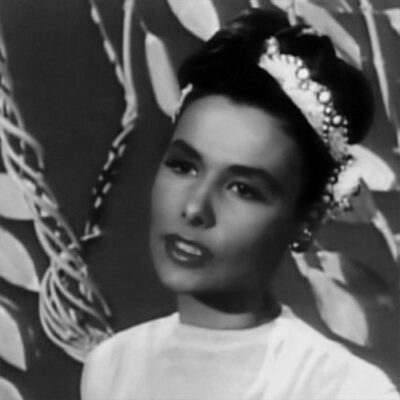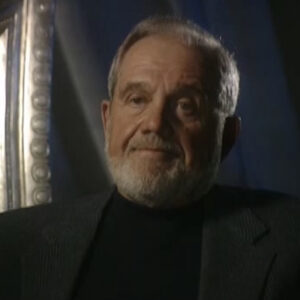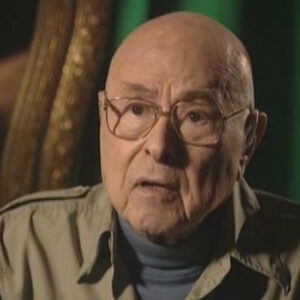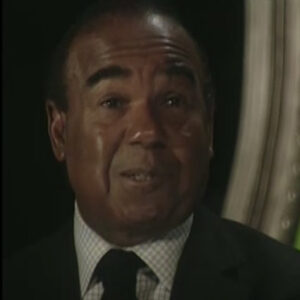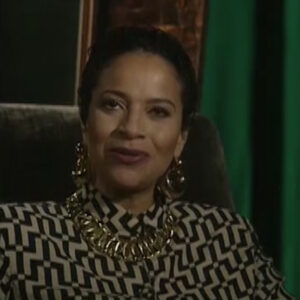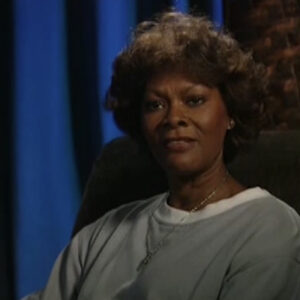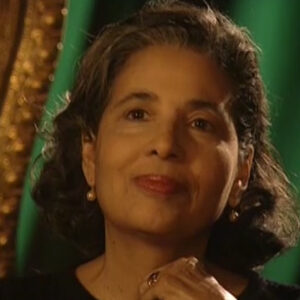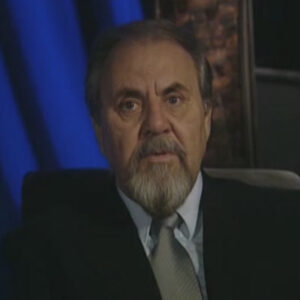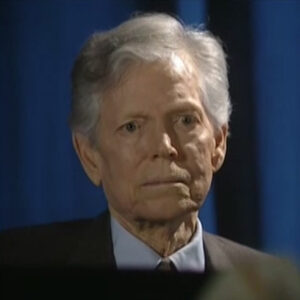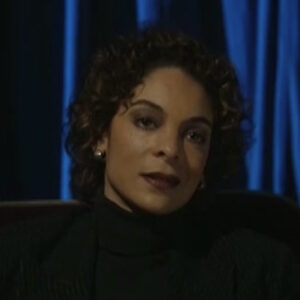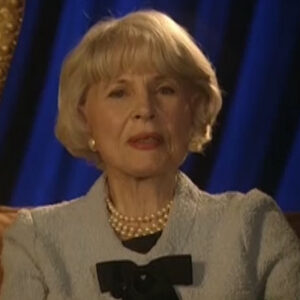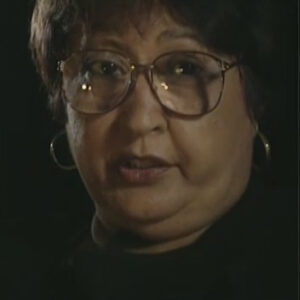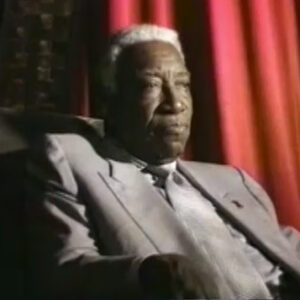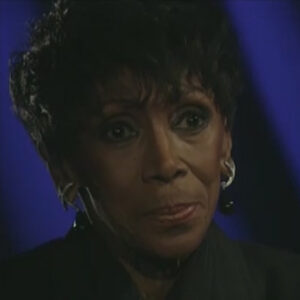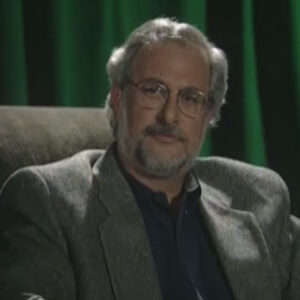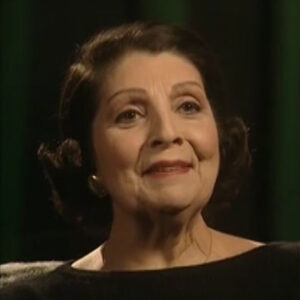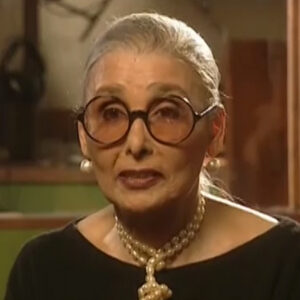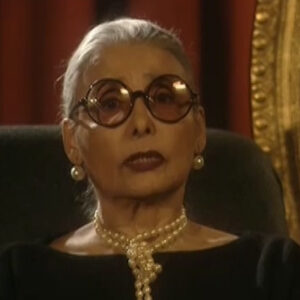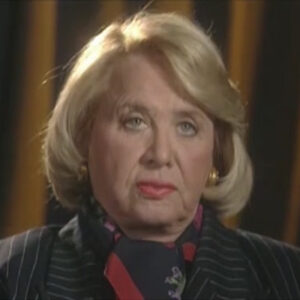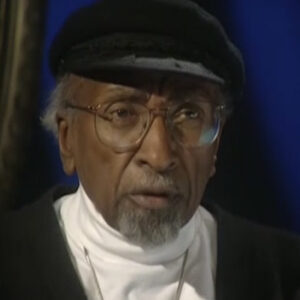Speaker I sometimes feel that the whole pattern of my life was established on the morning of my birth in Brooklyn, New York, at a Jewish lying in hospital in 1917, and because I was the only copper colored baby in the place, I guess that made me a little odd. And they hadn’t seen I had a father, but he was gambling to get dough to pay for my birth, and so they all saw my mother and my grandmother never picturing that I was going to be me. But my father was away all the time and my mother was away all the time. But always when I did what I had to do, it was an oddity being I was in so many first time places that it was always an oddity of my color. And I wanted to see more as I grew up my father.
Speaker But my father was tough, hardworking provider.
Speaker He was a gangster. He was a numbers. He was in what we used to call sporting life. And he put all his three brothers through college by doing this and giving up the educated. And I was always fascinated with my father from the very beginning. I really wanted to marry him. And the my husband that I did marry was in the same place and Pittsburgh. And I thought if I go to Pittsburgh, I see my father and that’s what happened. Wrong move. You know, my mother was like one of those Tennessee Williams little leading ladies, uh, etherial and and langurs and like Tennessee Williams hairlines. And that was the kind of people that had this little copper colored chair. We want to try to tell me why you want me to go. Williams White ladies, very, very moonlight and roses and very, you know, keep the cup on the Saucer Street type ladies. Very serializer. I just love the was like a story looking at her, only looking at other that.
Speaker Would you describe her as.
Speaker Now, it’s a drama has many kinds of things I think they think about, but she was single minded. She wanted to be an actress and she didn’t know how to do anything else. She was raised by her great, great, great grandmother who was African from Senegal. And she she told my mother that she didn’t have to wet her hands in dishwater and she didn’t have to read books and that she was an African and knew the way she wanted her raised like a little fairy. Tennessee Williams Jr., uh, and I think she must have been mixed up to, uh.
Speaker This for me, was I playing with the paper? Oh, I should stop talking with my hands. All right. You want me to do that over again?
Speaker No, I think that’s good because we’re going to do some sound pick ups as well.
Speaker I could go back to my father and come in. Yes. Yes, you could just, uh. I wound up talking when I went to Pittsburgh. I really wanted to marry my father because that’s where I live.
Speaker But, uh, my, uh, my father was a man. The part he was he was angry.
Speaker He was, uh, he was strong. And all the connections that he made certainly called for a strong person. But on top of that, he was like a lot of wild young black men. And it was a sort of nice process to have in the family of airy fairy Tennessee Williams ladies. And he, uh, he was when I got a chance to be with him, I realized that his arms had been there for me all along because the people that knew him and respected him was like me because I was his daughter and he just didn’t have a chance in the establishment. So he took it. He did what I did. He got out. I don’t say that, uh, he knew that he didn’t have a chance with the establishment. I think that made the choices my father made more understandable. And he did have to be away a lot lot of times. And to me, he was like a fascinating like a Wild West. He used to tell me stories about when he was in on the end of the gold rush in California. And to me, he suddenly became a cowboy. And I had these lovely dreams about him, didn’t have to see him to dream it. I think that he and my mother shouldn’t have been married. I think that that was not as much as they could have in common, except they were both good looking.
Speaker And I think that’s all they had. And you can’t get married on stuff like that. But they did.
Speaker Could you just tell us they were divorced, perhaps? Yes.
Speaker And I miss them, even though they were divorced when I was three years old. I knew he was there somewhere and I was just three when they got a divorce. So in the next two or three years that I didn’t see him, I had the romanticism I had about him just grew and grew.
Speaker You know, yeah, you say yes, Cora Calhoun, Hawthorne, my grandmother, Pearl.
Speaker Can you describe this the next part of your relationship, the relationship between your mother and your grandma?
Speaker When I was up until I was five years old, my mother lived in my grandmother’s house and my grandmother must have seemed a formidable person to my mother because my mother had had the soft touch from her grandmother and to come into a house that was run by a little tiny woman who had raised four boys and never let them forget it. It was my mother was taught to be lazy and not contributing and being too delicate for my grandmother’s strength. My grandmother was a strong lady and actually, though she and I fought all the time things that she taught me, I remembered. I remember them today too. But she wasn’t easy on my mother. My mother was not cosseted by my grandmother. She thought that a woman who didn’t really get out of work except a stage was not fit for how they even practice her hard frozen.
Speaker I must have been. I was raised by these schizoid people, I don’t know.
Speaker But my grandmother drove my mother crazy and my mother drove my grandmother crazy. And I was there in the middle of it. But they were all there together and I hope they would go on. But it didn’t.
Speaker Could you would you describe them as being like oil and water?
Speaker Definitely, I would describe them as being oil and water, except that they were both good looking.
Speaker And I’d have to say my mother was in the perfume, a puddle, and my father was in the street, the real.
Speaker You went after it was after the divorce that you went with your mother and now after the divorce and she was still living there, my grandma my mother got so unhappy and exploited, she thought because my grandmother kept saying, why don’t you do this? Why don’t you do that this way? And my mother went away to hard to get away from all this. She left me there with my grandmother, but she went to Harlem and she had somebody come and pick me up off the street and bring me to Harlem to be with her. And that’s when the whole thing started with, um.
Speaker But eventually, did she leave to go work with the travel company?
Speaker Oh, yes. Well, at the time they took she took me up to Harlem. She was working on Little Tilba show jobs and sometimes in a tent or sometimes in the cities that black people could work in and, uh, Washington, D.C. and Philly and otherwise out with tentacles. She left me there with these people when I was five and I stayed with them a while. They were show folk and they took care of me for my mother, but. It was when I was five and I had to adjust to a different type of parent who’s from these nice show people having just left my grandmother and I suppose being around for a while had made me a little snob to. But my mother left me with these people and I spent a couple of years up there in Harlem and sometimes she’d come back and sometimes she’d take me and leave me with other strangers. And by having this happen to me, it made me very suspicious, very. Made me very secretive, made me please whoever the people were that she left me with to please them so they wouldn’t kick me out.
Speaker And sometimes I was with people who nothing could stop kicking me out, you know, but it in the chance that I would see her, I didn’t mind.
Speaker Was never for very long. No.
Speaker You want to take a look at that is when we now on the premises, when you’re moving around. Yeah, that you can when you go to Brooklyn, you wish you could stay. Yes, definitely. Now and then. Yeah.
Speaker Yeah. And you were having this gypsy life. Yeah.
Speaker Eventually your mother realized that and let you go with your grandma walking home for good.
Speaker Yeah.
Speaker Well, now and then I would I would begin to hope terribly to go back to my grandmother while my mother was in Brooklyn and in Harlem. Um, so my mother was would come back off the road from wherever she’d been working. And it was nice to see her and have her for that time. But it was painful for me to deal with that whole thing because I was I was switched around so that I never had a solid family behind me to and and I think because I would be unhappy, quietly unhappy when I was on these trips with my mother, because I didn’t want to get to safe feeling because she’d come and take me away. But finally, she let me go for a couple of years, all in one year to be with my grandparents. That was my Brooklyn. And I would I was not making either family happy, but I was happy being there in Brooklyn with it. It was family. There was a fence around an iron fence. And my grandmother, who was stern and tough on me, but my grandfather was there and he was wonderful. My grandfather is the one that played Verdi instead of whatever the music was at that time. Jazz, I guess. And they didn’t sing gospel. Unfortunately, they didn’t really listen to it because we were Catholic family. And if they were monks doing chanting and they that was OK. But never any kind of thing was real life. But it was protective and it was mine. And my uncle, my youngest uncle was there as a teenager and he’d give me breakfast in the morning and my cereal, that is, and leave me in the highchair. And my granddaddy would bring an apple and a and a Coke chocolate bar, Hershey’s chocolate bar to me for my lunch, and then he’d be home by five o’clock. Meanwhile, I played in the backyard by myself and I had a latch key in case anything ever happened. And this was young, you know, but it was heaven because I didn’t have that fear of my mother coming home defeated by not making it easy to be a glamorous star. And my grandmother sternness at what she could see was a weak spot on me because I was my mother’s child. It was only very exciting to me. Now that I look back on it, I didn’t know what was being pounded into my head, but it was exciting because my mother wanted me and then my grandmother wanted me. And at least those people were steady in a place in Brooklyn. My mother took me out on a tent somewhere. I want to know what it was she was going through. But when she finally let me stay with my grandmother for a time there, that was a great treasure in my life. We had a little group called the Debs, and each month it did a different house and the mothers would make great food for us and we did nothing but to be a part of another thing that made me feel a person. I was a part of a Brooklyn group and I didn’t want to leave all that. But my mother came back into my life with a stepfather who was Cuban and white, I guess, and he began to be unhappy. I don’t blame him because he couldn’t speak English at first very well. He couldn’t get a job. And my mother had a connection with show people, so. In the midst of all this deciding what to do about my stepfather and help him be a little easier on me, uh, my grandmother died and, uh, I really I lived up in the Bronx around a lot of white people who were very nice, somewhat. But if I couldn’t be with my grandmother, I just didn’t want to be with the other part of me either.
Speaker And when she died, that was a great piece of my life. The early part of me went with her because my grandfather died soon after that. And my mother, unfortunately, had not been happy with my people and she wouldn’t allow me to go to the funeral.
Speaker That meant a strange thing in my life. I guess everybody may have that problem with our grandmothers were important and that she didn’t allow me to go with my uncles and my father to the funeral of my grandmother. Took me a long while to get over there. Uh.
Speaker Can you just say, yeah, grandma? Yes.
Speaker In fact, I was named for my grandmother’s sister. My grandmother had a sister named Lena and when I came, my mother was terribly disappointed because I wasn’t a boy. But when I came, she said, all right, I know she must set yourself. I don’t like your grandmother that much. I’ll name of your grandmother’s sister. And so I was Lena Lena Calvin Hall. Her name was Cora Calhoun Hawn. And I met later some of the Calhoun’s.
Speaker OK, one other thing I would like to just yeah, because I was happy there.
Speaker Yes, I was happy there in Brooklyn with my grandmother.
Speaker Actually, tell me that, yeah, um.
Speaker The Cotton Club was very important in those days, it was a place that did not allow black people in it, but they had black waiters who needed the work and they had. Black girls, me included, whose parents were not allowed to come and sit and see them in the show. Now, I couldn’t I couldn’t sing worth a lick and I couldn’t dance, but they hired me because I was young and cute, you know, and so I wasn’t really prepared for that. But it was a way to get away from my stepfather.
Speaker The reason we’re not we don’t have to go. I’m blessed. What I say about it, that their families couldn’t come and see them.
Speaker Yes, to people to even though they did wait on tables and yes, you’ve got all that, OK. The Cotton Club was owned by a couple of white gangsters and they had been showcasing black talent up there in Harlem for quite a while. And the working conditions were awful.
Speaker I mean, we were exploited and in very many ways and not very nicely talked to, but it gave a lot of us work. And it was I was 16, though. I was young and I could take anything and I was enough of a kid to be stage struck by seeing great black stars at the.
Speaker Could you just tell me this? They showcase black talent to showcase black culture, whites only.
Speaker Yes, it was owned by a couple of white gangsters who had been showcasing black talent in Harlem for the white people for a long time.
Speaker And even though we were not treated very well, it gave a whole lot of us work. We and today, even when I think about it, I say, yes, if it hadn’t been for the Cotton Club, I wouldn’t have had anything to eat. But it wasn’t true because they gave us free turkeys every Thanksgiving Day. But I was excited about it.
Speaker Your big break, black when I was ago. Now, is that been done? Did I say, OK, good when he went on to become a dancer? Yes.
Speaker He was a fabulous dancer who who was not appreciated by the people who got in a certain pattern set about black performers. And he was going to sing a song called As Long As I Live in the Cotton Club. And they chose me for a partner to just, you know, be cute with him in this number. And that was Song of Harold Arlen. And I met him then at that time when I was 16. But because I did fairly well and look cute in this number with Avon, my mother got a tremendous bee in her bonnet. She said, you’re going to have a career, you’re going to be a star before I before I even learn how to do a timestep. Anyway, I guess that was the thing that got me started in show business. Seriously, I learned a lot from Avon and. From the other stars up there, but my mother wanted to have a star of her own, and she said since she didn’t make it, maybe, maybe there’s something for you there.
Speaker I got to know my father better because I’ve heard about him. All my life, even though I wasn’t with him, I heard that he was great looking and he was tough and he had many friends sort of, you know, and he had become a part of my protection in Harlem at the Cotton Club, because if anybody looked askance at me, they would tell that story on a don’t mess with her.
Speaker And but all this while I wasn’t seeing him and when he finally came to see me at the Cotton Club, he was allowed in because he was with three other famous big name black men who had money and who were in the rackets and who were allowed to sit in the club in one of the booths, not with the audience. And he came two or three times and he was more glamorous to me than anything. He was beautiful. And some of the girls had been with him and they talked about my father to me. And between being jealous and being glad that he was around, I was a big part of my life at the Cotton Club.
Speaker I must have been great. Yeah, it’s always fun to know that. Your girlfriends. Yeah. Uh huh, yeah.
Speaker Uh, we, uh, when you left the Cotton Club, you went on the road. You talked about that at length. But it would be great if you could tell us you’re looking at.
Speaker Yeah, I’m there about being on the bus with the musicians. Yeah. Uh, yeah.
Speaker My stepfather, uh, my stepfather didn’t understand black people, black men especially.
Speaker They put away with, uh. Yes.
Speaker My mother, uh, after I left the Cotton Club, after I sort of escaped from the Cotton Club, I went with my mother and my stepfather with the, uh, Noble Sissel Band. And we traveled on a bus and it was OK with me because I said I was young and excited, but my stepfather created problems for us, for me, because he had no respect for the black men that I worked with and the orchestra, I guess for his times, that was pretty normal, his time and saying that he wasn’t American and wasn’t black.
Speaker He created problems by by dissing black musicians. Why did they put up with this?
Speaker Why did you you know, and I was more like my musicians and I was like my white father and stepfather. And I didn’t like him doing that. I didn’t know why I disliked it, but I disliked it.
Speaker And he wouldn’t he didn’t want to come in the back door at the Ritz Hotel in Boston, where I had my job with Noble Sissel, and he made some made it seem so dreadful that he had to come into the back where he was. You know, I can understand his part of what he was was not like part of what I was or what I was wholly. And my mother went with her husband naturally. So I was very happy when they got off the bus finally and left me with the orchestra. And I didn’t have to put up with race. And I was used to going in back doors then and I have to cough. I’m sorry. My stepfather also didn’t understand that the black man and woman that he he was with had an understanding about racism. And we and any place, the band, when they were not allowed anywhere to live and when the bus would go through certain towns that were not great, the middle class. Well, I mean, the more the middle class black people would invite Mr. Sissel and me and my mother that we could live at their house in Indiana and Alabama and and Upper East where these race problems were. But the people who weren’t in the middle class, in the orchestra had to do what they did when they were with the. Galectin, when they were with tiny Bradshaw, when they were lucky, Mellander, when they were all with this great bandleader’s, they all had the same problem. We probably all lived at the same boarding houses and we drank from the same sort of, you know, together. My stepfather just did not understand this. And I didn’t have time given the history of jazz, you know? So that’s the way it went.
Speaker After you had your first.
Speaker Soon after I had my first start at home, soon after I had my first baby named Gale, a call came from California and said we remembered her when she was singing with no social band. Would you like to come to California and be in a movie? And of course, I didn’t want to go to California then or at any time, but my baby was only two months old and we were getting a little money. I would get it. And so my husband said, OK, but, you know, that’s it. So I went to California and I was so unhappy because I wanted to see my baby and I wanted to be with her. But he allowed me to go to make the movie in L.A. But when I came back, he would not permit me to go to the showing of this movie, even when it was shown in the blockhouses where it was shown and that.
Speaker It may.
Speaker It made me unhappy because I wanted to go and see it, but, uh.
Speaker Nothing happened with Pittsburgh and.
Speaker I just know when I was in Pittsburgh, after I had done this little movie, my husband’s father, who was a minister, and he they begged me not to leave my husband. And so I stayed there and conceived Teddy, my son, and. Even he couldn’t do anything about working and having a job, and as my little boy and my big boy had problems because he was a politician and, you know, our politicians connived to make it well, he wasn’t with the right side. And lots of things happened to defeat him. But I wanted to pay the bills and I wanted not to ask for money for for my father, for toilet paper. The man who sold groceries, you know, so I knew I had to get to work.
Speaker Um, OK, well, that’s great, we have to go and get another job, and I wanted to leave Pittsburgh because I didn’t think I could get a job in Pittsburgh like a cabaret, like the Cotton Club was.
Speaker And my husband said one thing.
Speaker He said, all right, go, you’re going to wind up in the gutter, but you can take Gaile, but you can never have Teddy. And that’s another canopy’s lowballed.
Speaker So we were talking yesterday about easy to get a job, right? Yes, yeah.
Speaker Um, I start when I went back to get a job after I left Pittsburgh, I went back to New York after I had been in Pittsburgh and lived at the Theresa Hotel trying to get work. I had offers to get work from two white establishments who wanted me to be Spanish. And I yeah. So forget it. And I had no Sissel couldn’t take me back because times are hard. And I was sitting there chewing my nails. And a wonderful black choreographer named Clarence Robinson found me in the back row at a theater. Loews, Victoria, I think it was. And he said, hey, come on, I, I think I got a job for you. And I went out there and he said, Charlie Barnett’s looking for an act because his singer is sick. So I said, oh, you know, how can that be? But I had forgotten the Charlie Barnett had Billie Holiday for her first that kind of tour. And she had was an idol of mine, of course. And he said, go see if you can get the job. So I went up there not expecting much and I sang something Betty Grable hit or Dinah Shore hit. And they hired me to be the vocalist for a couple of weeks, I thought.
Speaker Um, when pick up the name of Charlie Barnett, OK, Charlie Barnett was great because he he won, he saw something and the singing, which I didn’t see yet, and he had some writers write these two little crazy songs. And I recorded one of them with him that I remembered from the Cotton Club and Nina Mae McKinney singing it called good-For-Nothing Joe, which had a reasonable name recognition, and another one called the captain and his men. Here come the captain. Engagement’s brave soldiers understand it was a party, so I wouldn’t listen to it now. But there you go.
Speaker And that was on the recording as well. Yeah, yeah. No, you know the captain that is man. Um.
Speaker We need to just get this lie about how you got to the court that maybe George Zimmerman through Charlie, remained that cafe society.
Speaker Yeah, I’m sorry. You know, why can’t people be normal and look at somebody’s moving papers and everything, whether they are. Oh, it’s the microphone that gets angry. Uh huh. What? Well, I was with Charlie. He had these songs written and I record while I was with Charlie Barnett at the Paramount Theater. A man named John Hammond came backstage and said hello to me and everything. But he went downtown to Café Society and told the owner that there was a girl singing with Charlie Barnett who might fit in a cafe society. He says she can’t sing a bit, but she’s cute looking. And so I went to Barney. Justin had an audition and I sang Georgia on my Mind and he said, Don’t ever sing that song. I gather he wasn’t with the Confederate side. But anyway, I said, why not? Because, you know, it’s a pretty song. He said, I don’t want you to sing that. I want you to sing the blues, probably. And so I said, I can’t sing the blues. So they began to have a problem when they. But my orchestra was Teddy Wilson and the band, I mean, his orchestra and Teddy began to teach me that began my teaching. Cab Calloway had started it and other music. Jimmy Johnson admired that Cotton Club, but Charlie was a new person who brought in new people. And when I got to Cafe Society, I met new people like Teddy Wilson, who was fabulous, and he taught me how to carry a tune, you know, and that began my musical education.
Speaker How come he didn’t I mean, yeah, yeah, you chopped off and I hope everybody thinks that you’re you can sing the blues. He says that because of your own background, that didn’t come as naturally.
Speaker No. And it’s so funny. Barney said, don’t sing Georgia. But what about a blues? Sing the blues? He said, I think it’d be very funny to the audience if you sang the blues because you look like a person that no man would ever leave. And I said I had to cycle that out. But he still had an old idea in his head that we did sing the blues good, you know, and that’s been one of my crosses. I just never could sing the blues.
Speaker But there’s a, um. Yeah, I went to come from a certain place and you had to have that.
Speaker Yeah, I had to disappoint Charlie. I mean, Barney, I had to disappoint Barney about singing the blues. But I did go to see Billie Holiday. And I said to her, you know, they’re trying to make me sing like you and sing the blues like you do.
Speaker And I can’t do that.
Speaker And she said, you got two babies, you got pay rent, sang the blues. So I kidded around with the blues.
Speaker Well, it’s about just trying to yeah, yeah, you talk about the your life experience, you had not had the same kind of life experiences. So, yeah, part of singing the blues is the deal. Mm hmm.
Speaker Bonnie started.
Speaker Yeah, well, I wasn’t, but it was a kind of singing that I had been around when my mother left me with different people. I heard the blues sung in my early days whenever my mother would leave me. Once in a while there would be a blues song and I knew what they were.
Speaker But nothing about my lifestyle with my grandparents had equipped me to even approximate the blues. When I sang, I sang the European songs that everybody else was doing, but. I was often told by white people. You should sing the blues because you love your people and. I know you didn’t want to tell them the long story of my life, my I haven’t been around the blues that much and didn’t sing gospel because which is a black aleck to me. I was not raised in the church, as so many of our great singers were and. I had no no idea of how to show my feelings in a song at that time or in my life because I was raised to. Protect what little I had inside me.
Speaker Don’t let anybody know what’s there and to hide myself.
Speaker I was too. I was not able to.
Speaker This is all so much I sound so stupid, I can’t, but but the blues was not in my background. My grandfather hadn’t heard it. His grandmother was Indian out on the prairie and they didn’t sing the blues. They sang something else altogether. My grandmother wouldn’t listen to it. And I was left with people so different and so varied that I couldn’t pin down one that I live with who sat around, sang the blues all day. I lived with people who worked in white people’s kitchens and who had warm beds in their apartments. And that might have been the background for blues singer, but I would have to learn how to expose myself to be a blues singer, and I wasn’t ready to expose myself yet.
Speaker Terms of the world. Yeah, yeah.
Speaker Yes, well, he said it’s on page.
Speaker OK, Rock Cafe Society was awakening and teaching a lot to me, I met I was introduced to great writers and painters, actors and intellectuals and people like Langston Hughes and Orson Welles and and Paul Robeson. And I began to see all these wonderful, talented, not all of them black, but most of them black. And Paul Robeson knew about my grandmother and and anybody that could talk to me about my grandmother and my grandfather was great with me. I didn’t care what their color was. I wanted to hear more about my people. And I began to hear their Paul Robeson had been helped to get a scholarship to Rutgers for my grandmother and Langston Hughes. I had heard about my father admired my as a writer and everything. My uncles, when I met him, that was wonderful. And Duke Ellington. And they all belonged to me, you know, and I began to thrive meeting these people. But I was always happiest when I was with who played the piano, who played the drums, who blew the horn. And musicians became a center of my thinking and my training. And I even forgot to hate the white people who were included in that. I didn’t hate them. I just didn’t know them and didn’t want to know what I knew. I just wanted what we knew and my education was growing there. I shouldn’t say that because education people think it’s just a book, but I mean, they opened my head now.
Speaker Do you feel you were prejudice?
Speaker Oh, yes, I was. I wasn’t active prejudice. I knew that. But but what kept me from being an outand out prejudice woman was the fact that I did admire people. If they were brainy, if they had been to school, if they had a job of importance and made other people look at them. I was beginning to want to be around that kind of person and couldn’t learn a thing from the numbers because that was me. But I began to feel a little better toward white people that I worked with.
Speaker Uh.
Speaker I think until I went to Hollywood, I kept that feeling. Well, the same over the years that I went to Hollywood, where it was 1940 41, and everybody was kind of getting scared about war news, but I found a great many prejudiced white people in the school that I sent my son Gail and Teddy to.
Speaker And when I went to complain to the teacher about the fact that very many of these people from Oklahoma in the middle of the country now were calling my children, you know, anything. And Gail came on sort of crying, you know, one year old kid is five years old or a little older. It’s very hard to tell them that they’re different when they’ve been kind of, you know, saying that their mother. But I went out there to them and that’s the first time I had that touch for them of prejudice.
Speaker And so that brings back brought back my some of my feelings. And of course, my husband had had had little of what he should have had because of white men who had over and I had the usual prejudices of a person who was allowed to go just so far and no farther. And I learned that very early, no further. I learned that there were great differences in people all over the world because they were nice at Cafe Society didn’t mean that I was bringing them out there to California, which was. Even then, allow mixed marriages that that year, you know, can we go back up to.
Speaker Oh yeah, while I was in cafe.
Speaker I met two of two men while I was at Cafe Society who became a part of my life, I met Walter White, who was head of the NAACP, and I know you know that. And I met Paul Robeson, who had known my grandmother. And I was beginning to to try to pin down things that I was learning.
Speaker And I said to Paul once I feel isolated, I really felt the beginning of sort of separate but not equal person happening in me.
Speaker And I said, Jim, what do I do to to cope with what happens and what I hear around me and what I am? And he said, look, he says, you’re a Negro. They said that. Then he said, you’re Negro. And that is the whole basis of what you feel and what you accept, he said, and it’s the basis of what you will become. He said when you live and learn a little more about being a Negro being you, you will be Lena Horne Negro. And he put right in caps. And I that was very comforting because it was very confusing for a while.
Speaker And you said it helps ground you.
Speaker And I would say I would have to say hearing Paul say all this to me was like I was being grounded. I knew where the electricity was. Well, plug in, plug out. And I knew that I was me. He gave me the address. He grounded me.
Speaker Wonderful, wonderful story. I just need you to say one thing. Yes, but it was not the last. Oh, this is about how happy you were. Yes. And so Paul covered that.
Speaker We just pulled Paul home ground with me. And I was happy there at Cafe Society, but it was not going to last.
Speaker All right, now is Hollywood bye bye. Yeah, a little bit now that I saw the they’re not, but but now we want to make sure we give you. Yes. All right. Are you ready, gentlemen?
Speaker Gentlemen.
Speaker Ah, I got a call while I was at Cafe Society from this little crazy manage manager I had at that time. He was old man, but very nice. And he called and said, they want you to come to California to do a show with Ethel Waters, Duke Ellington, Katherine Dunham.
Speaker And that was fantastic to me. But I didn’t want to go to California. And I was talked into it by Walter White and a couple of not Terry, but a couple of guys in the band.
Speaker And they said, yeah, go on out there, you’ll be going to be a movie star. And I didn’t want to go. I was happy there at Cafe Society. I was living back in Brooklyn with my two babies. I didn’t want any part of Hollywood because I knew what Hollywood was like. I thought and he said, But we want you to go because the unions have not been they don’t allow black person behind the camera. They don’t allow them and soundstage, they don’t allow any black people. And we want to break that union. And that didn’t really penetrate to me as deeply as it did later, because when I went out there, it’s true that I, I didn’t see anybody.
Speaker Man, the shoeshine guy was only black people out there. But the unions were white only in every line of work, that is, and the movie set. And so I thought maybe I was doing some good for Walter White and then and and the Urban League. And I said, all right, I’ll stay. And that the war scare was happening.
Speaker The big show never happened. And I had to wait around out there and long to be back in New York away from and beside the being important about the union scared me. I was not ready for that. Politically, I. I knew that I could be useful. They said, you know, we can break into this if if they see more people, I we’re going to see more than no harm. But anyway, that’s why the other way came down on me being exemplary and being a token nice Negro.
Speaker Needless to say, I was very unhappy to get back to New York and what I thought was not segregated New York while I waited around in Hollywood to be in this great big show. The war efforts were war efforts. The war was approaching and the Californians were scared because there was signals and submarines and all this kind of jazz. But I finally opened and a little nightclub with Katherine Dunham as a leading star.
Speaker And after that, you went, oh, sorry, I’ll be there.
Speaker Oh, God, I want to go to Hollywood and you. All right.
Speaker While I was at this little club with Katherine Dunham, she left because this place was so small that when her dance, dance, dance around the skirts would go on people so not drinks over in the area. And she was pretty unhappy with it. And she left and took her trip. That had been very happy being with out there in California. She left and I had to be by myself in this club. Well, the only reason it was good for me was because it was small. I didn’t have to use a microphone and I, you know, was not intrusive because it was a tiny club and people came to gamble upstairs and all that kind of goings on. But movie stars began to come in. And I saw Marlene Dietrich and John Barrymore just before he died and and the directors and all. And evidently someone who had seen me in New York with Noble Cecil, a wonderful man named Roger Edens, came to the club one night and he said, I want you to come out with me to MGM and I’m going to tell your manager to have you come to MGM and I’ll meet you at the gate. So I said, OK, let’s go take a ride at MGM and I went out there and they took me to Arthur Freed’s office, Arthur Freed was a great producer. He had produced and he was in charge of the musical group that MGM musicians. And he they took me and Roger came into Fred’s office with me and Roger sat down piano. He said, I want you to sing. So since I didn’t have any illusions about being hired of no ax to grind with them, I sang I Don’t Care. And he played. He’s used to playing with singers. And it they thought it was good, you know, and they took me from there to L.B. Mayor’s office. And Marion Davies came out from his private sort of place and she listened. And I was surrounded by all this glamour and they began to talk about me being at the studio and they were shouting B.S. on me, you know, and everything and saying that I was, you know, and they had just to sing to move movie to put me in. We want to sign you up. So I went home that evening and I call my father because my father knew what the world was.
Speaker And I said, and they want me to be in this movie studio and put me in a movie. And I said, I’m by myself. I have nobody idea, would you come and be with me?
Speaker So my father came on a plane and took me to Mr. Mayor’s office. I took him, rather, and they said he said, Mr. Mayor, I’m Teddy Hahn. There’s my daughter. And he was sharp. I mean, my father was gorgeous and dressed beautifully, as he always did. And he sat down in the chair and he said, I don’t want my daughter to be in the movies. He said, because I love seeing black people in movies do his work with Tarzan or be somebody made. He said, I have made for my daughter. She didn’t have to do this. And I’m sitting there listening to him. Then go ahead.
Speaker You know, my father and Mr. Mayor sort of I think he was rather taken aback because this was a man who met him on equal terms of an unequal, I thought, and he was just laying down the law. And so Mr. Mayor said, oh, Mr. Horn, we’re we’re never going to do anything demeaning. I think it occurred to him then that there might be something wrong about his attitude because he saw that I had a father and a protector and I was just having a ball listening to the whole thing. So I said, we’re not going to do anything to to demean Miss Horne and she’s going to be added to our roster and she’s going to sing wonderful songs and be dressed beautifully. My father said that’s OK if she wants to do it, he says, but I feel that the first time I see her and one like I’m talking about, I’m taking her home. And that was my entrance into MGM. They didn’t know what to do with me then because my audition was to be a part of a maid to Janet MacDonald. And they had me being the maid and Eddie Rochester again, who very famous he was going to be my my sweetie. And we were going to wait on her. So they called that off and they never gave me that part. And from then on, the mystery of Lena up against the Ivory Coast, singing a song, aloof from the audience, aloof from the people in the movie. And that’s how I spent part of a seven year contract that they insisted I sign.
Speaker That contract. Yes.
Speaker And yeah, here, because they because of my contract, they did they let me work in Cabaret’s that they had money in, but I couldn’t work in any others, especially when I was on punishment. They took my salary, you know, for years, not years, but months, a year at least.
Speaker They I don’t know how I must have said that my experiences on the road made me mad. We made sure that my contract specified that, oh, maybe they had a car, had something in there. I never read the fine print that said, oh, she’s black so she can work in certain places. And if you don’t want to it in yourself, they might have had that in there because they were very determined that they weren’t going to push me on the road or any place else.
Speaker What would that if we can phrase it a different way, because of my GEMCO experiences on the road, I think MGM made sure that my contract specified that I was not to be sent to hotels that wouldn’t take me in or in.
Speaker But they had all that and they had that in the movies.
Speaker I don’t know where that came from, just like that. So you were the first black. Yeah, right. And that and because. But me. Yeah.
Speaker It’s really about setting up what the problems were with the other black. Yeah. I became afraid that they might lose their.
Speaker Yeah I did. That’s, that’s very true in any case. In any case, I became the first black to be signed a long term studio contract, seven years. But we were very careful because of all my GEMCO intelligence that I had. I was able to tell the studio that I was not to be sent to places where I would be insulted. I was not to be put in with any musical group that could would offend me or offend them. And they probably told a few of them probably had in the contract that I was pretty pushy, not pushy, but aware. And this this got me into a lot of trouble with black actors, my signing this contract, and they are hearing that I would not do certain kind of work. They began to be unhappy because they thought this might be the start of lessening jobs for them in the jungle. Pictures in the major stuff, in the everything that the few things we are allowed to be in dialogue with, with white actors. I think that they began to feel that I was going to cause a lessening of work for them.
Speaker And that made me because I didn’t have that on the brain. In fact, I had nothing against playing maids. But by the time they put the makeup on me to make me match the darker actors that I was working with, all they had was teeth. And, you know, and I didn’t work out for that. And but the black people had their guild.
Speaker They called me in front of them. And that was a very rough time because I began to be this person right in the middle. I wasn’t on this side with my own people and I wasn’t on this side with white people. So I began became that sort of Nuada individual and the great Hollywood scene. And when they found out that I wasn’t making any money, any more money than they were and not working as much as they were, they loosened up on me, my own people.
Speaker That is that is that came a little bit later. Yeah. We went back to.
Speaker Well, this is a new line. I shouldn’t have said. I felt very emotional.
Speaker All right. All right. Did you feel isolated? No, I did the right thing.
Speaker I felt I felt isolated from my own people because of the man who brought me out there to work in the cabaret had gotten me up to two room apartment for my Gail and my boy when he came to be with me in Hollywood proper on Hawthorne Avenue and.
Speaker I wasn’t near Hollywood is miles apart from anybody, I was miles away from the studio where I worked and miles away from the west side of town with my own people lived in Watts and so forth, so that I was sitting out there in Hollywood on that hill with nobody on either side for a long time.
Speaker You were like, oh, yes, my father came out to be with me a little bit.
Speaker And soldiers began coming in from Baghdad, further down from the war, and they’d come to my house and take a bath, you know, they didn’t have to go. And a lot of my friends would call Cole Porter and they shot people and they had a place to come and be with the copper colored baby.
Speaker When you went back, we’ve already got this story. You’re going back to New York.
Speaker But they when you went out on the street. Yeah, with with the guys always beating the boys and I meant you here. Couldn’t you stay here? You want want. Yeah, yeah. Yes. What is it that Daisy said to you that.
Speaker I respected baozi, I mean, I respected the big men in my business and basic, particularly because he was a dual, Batia said, baby, they don’t choose us much. They chose you to be in the movies, we hope. And he said, you’ve got to go back there whether you want to or not, because you are going to make it possible for some of us. So get out there and be in the movies, too, and I didn’t really get that for a minute and he said, no, I’m telling you seriously, you go out there, you stay, you be the way you are and you’re going to make it better. And he was serious. I mean, because he never really got that way very much with people, you know.
Speaker And I knew I had to go back. And that’s my life with baozi.
Speaker What was it that said the same thing to me?
Speaker Walter had said it. He said, it’s very important for you to be representative and the you are going to be helpful to get somebody black in the union. But when I heard baozi say that, they see was like.
Speaker My you know, my my brother, my my sweet, we loved him, I loved him, and when he said it to me, he was very serious because he was talking about musicians.
Speaker He was talking about.
Speaker Black men, black women, and he his saying it made it even more akin to me than the unions and Walden is because he was us.
Speaker Obasi was.
Speaker I wish I had basically for a brother, really, brother.
Speaker Have you also make you put it from the other side in your book? You talked about how it always made you feel that great big favor was being.
Speaker Oh, that that was from another beginning.
Speaker And that he made you feel. Yeah. You were, in fact, worthy. Yeah.
Speaker Yes, I, I remember yesterday we talked about that I loved baozi as most everybody did at that time and not up until now and.
Speaker That it had been said to me by Walter White and by Paul Robeson and various people like that, that I was important to do certain work and that I had been given this chance to do certain this work, and I had to do it for that base. He said to me, like he was talking to me, the real Lena, and he said, you know, we need you out there. And when it came from him, it was like it wasn’t a favor. It wasn’t somebody doing I wasn’t doing somebody something for the union or something for an organization. I was doing it through him for Lena, for me. And he made me feel that I was important. And that was probably the first time. That anybody had made me feel that I was somebody, so I wasn’t a token this, I wasn’t a representative, that I was him and me.
Speaker And that you had talent.
Speaker That was the last thing that would come to my mind, but that’s but let’s not go into that.
Speaker And nobody my mother would come backstage and tell everybody else, which is very typical of a mother. And I would say to Ricardo Montalban, oh, you are so handsome and so wonderful and say to Josephine for me and you are just so marvelous. And to say to me, you were pretty. Are you did you know enough about my hairdo? She never said to me I was nervous for you. I thought you did. So basically, I guess was my first motherly compliment.
Speaker I don’t mean that that was a I had never gotten it from anybody.
Speaker Just drive long straight because my father I was possession of his, you know, and he wouldn’t he would just say, I don’t want you to do that and I’m going to take care of you. But he never would say you’re great.
Speaker I took a long time to hear that because I didn’t believe it either.
Speaker Anyway, did you feel that night that that’s what you were hearing?
Speaker Yes, exactly. I felt everything he said to me was on my level as a person.
Speaker Not the other llena, you know.
Speaker I’m saying go back because you’re so you’re so good that you go back because you’re making me happy, he’s, you know, it was like that and it was on a very personal my stomach’s growling terribly.
Speaker Is everybody else is it thinking it up? Yes, it is.
Speaker And we can’t pass it off as me shaking. Let girls do one thing and I have to take some medicine. Probably it’s enough and they’re going to get care, huh. But you can look down. But you don’t want me to look down on basic. Yeah.
Speaker I’d always been made to feel that I was being done a great favor. I was being given a great favor. I was given some special advantage that had nothing to do with my talent nor my ability. And Bassey was the first person to tell me that I deserved the favor. So I got what I wanted, really, that I wanted from New York. I got it right there.
Speaker So when they were casting the movie show, they used a movie called Tom Cruise or something.
Speaker They put in it a few Showboat songs. So when they were casting the movie many years later, I hoped I would be chosen for the part of Julie. Instead, they chose Ava Gardner, who ironically was my best girlfriend, best white girlfriend out there, and they put on dark makeup created for me especially. They put dark makeup on her and she played Julie.
Speaker Great divide. Now we’ve got. Yeah, good. All this stuff about how you finally came to terms with what was happening in Hollywood. We have this line here. The two men are made to look in the camera screen. The first part of this, what they mean to me. Yeah, they had.
Speaker Right, and then they had made me into a maid, but they said they hadn’t made me and they hadn’t made me into a maid, but they hadn’t made me anything else either. I had become a butterfly pin to the lovely column and sing in the way in Movieland. I’ll do it over again.
Speaker Oh, yeah, you said camera and I got crazy. You are the camera. I am a camera too. They hadn’t made me into a maid, but they hadn’t made me anything else either. So I became this little butterfly pinned against the wall, leaning up, singing songs, singing My Heart Away in Hollywood. Great.
Speaker Oh. OK, let’s do it. Yeah.
Speaker They hadn’t made me a maid, but they had made me and anything else either. So I just became a little butterfly pinned up against the wall, singing all these lovely songs, singing My Heart Away in Hollywood.
Speaker OK, we’ve now. We should do the baby jazz and wear it. The only people who got me through this, I think would be you don’t. We can read this.
Speaker The only people, the only the only people who got me through this period in Hollywood were two men that I met there. One became my best friend, the other I eventually married.
Speaker Now, and this is in describing Billy Strayhorn.
Speaker He went with me to my audition at 5:00 p.m., we don’t have very many, so if you could look at me from Partya. Yes, um, actually, if you could you could read everything up to he was truly my soul mate. All right.
Speaker Billy Strayhorn went around with me to auditions and he played piano for me. I was always terrified, but he kept me calm and he made me sound good. He was truly my soul mate.
Speaker And now I’m talking about.
Speaker I first met I first met Lenny in connection with the freight unit at MGM, we didn’t like each other at all and I didn’t trust white men in general. And he was wary of singers, especially one who was having kind of good notices that I was. So it was several months before we finally connected if we discovered each other. And when we did, we became very close.
Speaker There was some stairs that I don’t hear them going to hear.
Speaker No, I’m afraid the camera pick it up, it’s our bad ears that we can’t hear anything.
Speaker So.
Speaker Hearing something like you should say, well, yeah, I talk like me, but but when I really was concise and better at home oh the first met Mytilini, I first met Leny in connection with the Frade unit. We didn’t like each other at all. We didn’t get along because first of all, I didn’t trust men or white men in general. And he was, he was wary of singers, especially one who’d been getting good notices, which I was beginning to get. So several months before we got acquainted and before we began to like each other. And when we did, we became very close.
Speaker Good on, Sam.
Speaker I have to look up now.
Speaker Yeah, yeah. All right. On what? Maybe on the very last day we went to Paris and got married and we got married in Paris yesterday. Yeah. Good luck on our relationship.
Speaker Me and Lenny became a kind of cause celeb and my own family hated it. And so the Hollywood community studios didn’t like it.
Speaker They began to cold shoulder both of us. So by the time I got fed up with Hollywood, we said, let’s go, Sharon, I’m so sorry. That’s what happened. I drank water just plain wrong. So so by the time we were both pretty fed up with Hollywood, he was ready to leave and so was I.
Speaker And we decided to go to Europe and to get married in Paris. And Billy Strayhorn and Luthe Henderson were eyewitnesses.
Speaker Face camera, well, we began playing guitar.
Speaker We began playing cabarets all over the world and I was successful. We were successful.
Speaker This is about returning. To you’re from your mom and dad are rediscovering that you get by customs, so.
Speaker To have anything on the Cadman’s Roosevelt quote. Yeah, you know, good when you’re doing that. Oh, all right, OK.
Speaker Yeah, I read it once and then when I returned from Europe, I found out I’d been blacklisted for my political activities and organizations I belong to.
Speaker I was just I had I just told them I belong to the same club as Roosevelt does, but I was still unable to do films or television. I don’t care for the next seven years. OK, let me do and keep this down. When Lenny and I returned from Europe, I found that I had been blacklisted and politically ostracized for my my activities and organizations I belong to.
Speaker I just tell them I belong to the same organizations and clubs Mrs. Roosevelt belongs to.
Speaker But I was still unable to do films on television or in theaters, all the movies. So Cabaret began to be my only outlet.
Speaker And they became my life and I became my life.
Speaker The next seven years I read that I was still unable to do films television for the next seven years. OK, why not? When Lenny and I returned from Europe, I found that I had been blacklisted for my political beliefs and organizations I belong to. And I told the people I belong to the same clubs and outfits that Mrs. Roosevelt does. But I still was unable to get any work on television for the next seven years, and that includes radio and TV. So Cabaret became my only life, my outlet.
Speaker Um, all right, this is and we’ve gone now. Yeah.
Speaker However, you have to look at this, you might want to read this.
Speaker Well, I was angry, so I developed a kind of toughness, a way of isolating me from the audience. It was a means of not letting them get to me, not letting them see that they could hurt me. I suppose in some way. I gave them an image of a woman they couldn’t reach. I’m sure that the isolation I wrapped around myself came from roots in my childhood because they’re sometimes isolation was my only defense.
Speaker So yes, yeah, I feel like you hurt me if you could try to do that.
Speaker Yeah, well, I was angry and I began to develop a kind of toughness that I thought separated me from the audience. It was a means of not letting them get to me, a get to know how I feel. And I guess it was just a form of disguised hostility and it was part probably of what I had begun to build around me in my childhood. It was an isolation that at times in my childhood, it became a defense.
Speaker And so that’s what happened with me and the audience.
Speaker Great.
Speaker One day I was in a restaurant, you know, just a little bit.
Speaker Well, do you want me to say the N-word, Sherman? All right.
Speaker And you want me to say it? Just say just say N-word o use the N-word instead of the word.
Speaker OK, one one night, my husband, Lenny and I were in a.
Speaker I was in a restaurant one night, my husband, Lenny, and I were stopped by a restaurant patronized by both theater people, movie people, and while he went to the phone to call someone for me, a customer angry because the waiter was waiting on me before he was raided, I said, well, who who who does she think she is? I mean, Lena Horne, she’s just another N-word, just like all the rest of them. And I got so angry, I picked up lamps off the table and I picked up glass ashtrays, two of them, and I threw them and he began to bleed on the side of his head. And the people were all standing, looking, and they said, What have you done?
Speaker I said, Now, here I am. I’m hitting you. I’m the N-word. You can’t stand. And you know, something like, I was so angry and I hit him and I went home, forgot about it. We went to the hotel where I was working.
Speaker And the next morning I opened the door.
Speaker There were press newspaper people down the hall and I said, What? What do you want? What, what, what they had heard about it, I don’t know.
Speaker News travels fast out there. And they said this guy was bleeding and they took him to the clinic and a hospital and you hit him. And it was a big deal, evidently.
Speaker But I began to get telegrams from my own people who said, hey, Joe Louis sent me was and I always said, you had a good write up. And I heard from people all over my people.
Speaker And I said, my God, this is the first time anybody ever paid any attention to me. I thought, you know, and I just hate because I don’t like him. It was instinct that happened, I wanted to kill him, but that was that.
Speaker Don’t blame me for wanting to kill it. We have a paper problem here now, but the place for you, this is not one of us where you guys I tell them.
Speaker I know, but I know that I can. Yeah, good.
Speaker And I know that I do want you to tell me. All right, and story. You don’t have to go.
Speaker All right. I mentioned him, but he was there, wasn’t alone.
Speaker Lenny Lenny and I were in a restaurant one night in Hollywood. And then he went to phone to telephone my friend Kate Thompson. I was left standing there and a white patron who had been sloughed off, probably not a white person was told by the waiter, this is Miss Lena Horne.
Speaker I’m waiting on her. I’m sorry. And he said, Who the hell is Lena Horne? Who does she think she is? She’s just another N-word, just like all the rest of them.
Speaker And I got so mad I picked up a lamp off the table. I threw that first. I picked up three other ashtrays, glass ones, and I threw them at him and he began to bleed down the side of his head. And the people over on his side of the room were looking. Nobody touched me because I was furious. And after that was over, they took him away fast and I went on home.
Speaker And the next morning when I opened the hotel door, there were press people on the media out in the hallway. We couldn’t really get out. I said, what’s going on?
Speaker And they said, you know, we heard you struck this guy, this white guy and everything. And I never knew it would cause a sensation because I began to get telegrams from my people saying, yeah, you know, that was wonderful.
Speaker I got one from Joe Lewis who said, I always said you had a great right arm.
Speaker And that’s the first time I knew that anybody else black was paying attention or care what I did. And that was the first time I began conscious, became conscious of the fact that I was not a lone.

